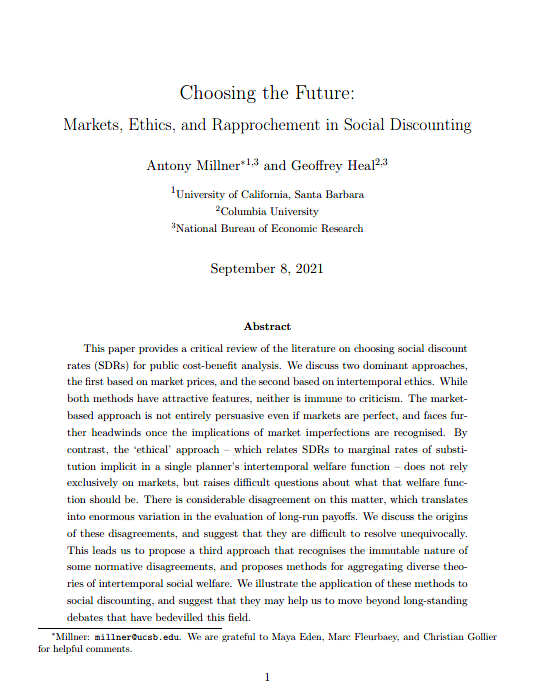Choosing the future: Markets, ethics and rapprochement in social discounting
Antony Millner (University of California, Santa Barbara and National Bureau of Economic Research) and Geoffrey Heal (Columbia University and National Bureau of Economic Research)
GPI Working Paper No. 13-2021, published in Journal of Economics Literature
This paper provides a critical review of the literature on choosing social discount rates (SDRs) for public cost-benefit analysis. We discuss two dominant approaches, the first based on market prices, and the second based on intertemporal ethics. While both methods have attractive features, neither is immune to criticism. The market-based approach is not entirely persuasive even if markets are perfect, and faces further headwinds once the implications of market imperfections are recognised. By contrast, the ‘ethical’ approach – which relates SDRs to marginal rates of substitution implicit in a single planner’s intertemporal welfare function – does not rely exclusively on markets, but raises difficult questions about what that welfare function should be. There is considerable disagreement on this matter, which translates into enormous variation in the evaluation of long-run payoffs. We discuss the origins of these disagreements, and suggest that they are difficult to resolve unequivocally. This leads us to propose a third approach that recognises the immutable nature of some normative disagreements, and proposes methods for aggregating diverse theories of intertemporal social welfare. We illustrate the application of these methods to social discounting, and suggest that they may help us to move beyond long-standing debates that have bedevilled this field.
Other working papers
How should risk and ambiguity affect our charitable giving? – Lara Buchak (Princeton University)
Suppose we want to do the most good we can with a particular sum of money, but we cannot be certain of the consequences of different ways of making use of it. This paper explores how our attitudes towards risk and ambiguity bear on what we should do. It shows that risk-avoidance and ambiguity-aversion can each provide good reason to divide our money between various charitable organizations rather than to give it all to the most promising one…
A non-identity dilemma for person-affecting views – Elliott Thornley (Global Priorities Institute, University of Oxford)
Person-affecting views in population ethics state that (in cases where all else is equal) we’re permitted but not required to create people who would enjoy good lives. In this paper, I present an argument against every possible variety of person- affecting view. The argument takes the form of a dilemma. Narrow person-affecting views must embrace at least one of three implausible verdicts in a case that I call ‘Expanded Non- Identity.’ Wide person-affecting views run into trouble in a case that I call ‘Two-Shot Non-Identity.’ …
The Conservation Multiplier – Bård Harstad (University of Oslo)
Every government that controls an exhaustible resource must decide whether to exploit it or to conserve and thereby let the subsequent government decide whether to exploit or conserve. This paper develops a positive theory of this situation and shows when a small change in parameter values has a multiplier effect on exploitation. The multiplier strengthens the influence of a lobby paying for exploitation, and of a donor compensating for conservation. …

